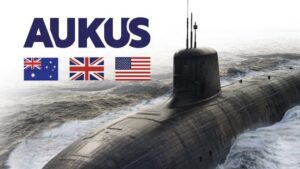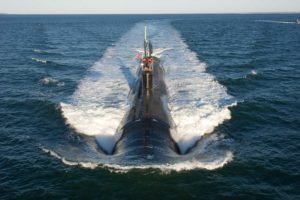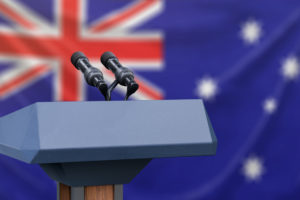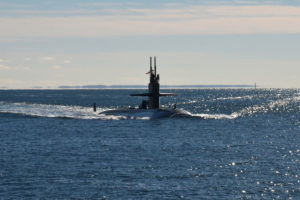10 April 2024
In March 2024, British premier Rishi Sunak declared a “national endeavour” with a new fund to “secure the future of the UK’s thriving defence nuclear industry”, to the tune of nearly £1 billion over the next decade. In conjunction with the announcement, the Conservative-led government released its highly-anticipated Defence Nuclear Enterprise Command Paper, setting out, for the first time, what would be required for the UK to deliver its nuclear deterrent. This paints a vision of a long-term commitment to the country’s civilian and defence nuclear sectors, including upgrading key naval bases and other nuclear weapons infrastructure, the provision of nuclear skills training, and a pathway for the new Dreadnought Class submarine class. The Command Paper also gave a prominent role to AUKUS, the trilateral security agreement between Australia, the UK and the US. Ahead of a general election, this article takes stock of the implications of AUKUS for the UK, appraising the risks and rewards of the trilateral pact for the country, as well as the challenges and opportunities that lie ahead.
Although the strategic rationale of AUKUS has never been formally articulated, there is general scholarly and policy consensus that it concerns the growing strategic challenge posed by potential adversaries, most notably China. Still, the impacts of AUKUS on a country level vary greatly between the three partners. Indeed, with the announcement on 8 April 2024 that Japan may potentially collaborate on the advanced capabilities aspects of AUKUS, differentiation may grow. Strikingly, it can be argued that the UK may have the most to gain and least to lose of the AUKUS partners. Some of these benefits stem from the integrative aspects of working in a tight coalition of trusted partners, enabling the UK to develop a strategic foothold in the Indo-Pacific. Yet there are a number of more prosaic benefits, including building a future nuclear workforce and developing economically deprived regions. At the same time, London will be cognisant that there are significant implications of playing a more strategic role in the Indo-Pacific, the nexus of sharpening rivalry between Washington and Beijing.
Reaping the Benefits…
Strategic depth in the Indo-Pacific
The footprint of AUKUS predominantly concerns the Indo-Pacific, aligning with the UK’s strategic ‘tilt’ to the region as articulated in the 2021 Integrated Review. The SSN-AUKUS (SSN-A) submarines being developed under the pact’s first pillar are a new breed of advanced attack vessels fuelled with highly enriched uranium (HEU). With a uniquely integrated common construction platform, the submarines are being built to a British design – and powered by a Rolls-Royce pressurised water reactor – but will comprise technology from all three original AUKUS partners. With their greater size and endurance, this long-dwell attack force will be capable of operating at depth for extended periods, taking the capabilities of the Royal Australian Navy from sea denial towards strike and in the process shift the military balance of power vis-à-vis China in the maritime space. The UK’s contributions to Pillar I can be portrayed as a demonstration of its commitment to global security, arguably strengthening British diplomatic clout in the region.
The new SSN-A fleet will also require advanced logistics bases for vessel maintenance, repair, resupply and communications. Under the AUKUS deal, the partners have agreed to increase the frequency of American and British SSN visits to HMAS Stirling in Western Australia. These rotational deployments, starting from 2027, will not only bring American and British military capabilities deeper into the Indo-Pacific but will help ‘accelerate the development of Australia’s workforce, infrastructure and regulatory system’. In so doing, Washington and London will increase strategic planning and intelligence sharing with Canberra. Closer to home, the UK’s SSN-A boats will make a direct contribution to defence – and thereby deterrence – in the Euro-Atlantic theatre as part of London’s contributions to NATO.
Economies of scale
AUKUS is a commitment to advanced technology sharing and military interoperability among closest allies. A key benefit to working in this deeply integrated manner is the economies of scale this produces, both in terms of cost savings and technology advancement. While economies of scale will be reaped across both pillars, they are particularly evident in the development of the SSN-A submarines. As a result, Pillar I directly supports the submarine design, manufacturing and skills base in the UK through the pooling of resources and joint development. Furthermore, the Royal Navy will construct its next generation SSN fleet on the SSN-A design, i.e. the successor fleet to the current Astute-class – with the design costs shared with Australia. The first British SSN-A will be delivered in the late 2030s (while in parallel the construction of the new Dreadnought-class SSBN will begin). After building sufficient capacity, Australia will start production of its SSN-As – excluding the HEU reactors, which the UK will contribute to – for planned delivery of up to eight boats to the Royal Australian Navy starting in the early 2040s.
With a multi-billion dollar price tag, AUKUS will provide a massive financial injection into the defence industries of all the partner countries. The pact comes at a time of relative decline in the defence industrial bases of Western states with their steady atrophy since the end of the Cold War (some estimates put US industrial base post-Cold War decline at 70%). In the UK, there are a number of defence sector companies that stand to benefit, particularly BAE Systems and Rolls-Royce which were awarded contracts for initial design work and later for the fleet’s construction. In January 2024, James Cartlidge, the Minister for Defence Procurement, told the House of Commons that, to date, “£4 billion-worth of contracts have been awarded to UK companies building SSN-AUKUS”.
Employment and skills boost
Making progress requires the mobilisation of a vast set of stakeholders across the partner countries, including the engagement of government and military agencies, the employment of specialists and contractors, and the training of new workforces. The British government has noted that Pillar I will ‘create thousands of jobs…in the decades ahead’; the SSN-As will be built mainly in Barrow-in-Furness but its associated supply chain will spread well beyond this location, including to Derby, the focal point for Rolls-Royce’s nuclear reactor work. Cartlidge’s parliamentary announcement noted that the programme will generate “an additional 1,700 jobs at the Rolls-Royce Raynesway site in Derby to build reactors for the UK and Australia”. Both Barrow and Derby suffer from higher than average levels of deprivation in the UK, and so the large investments under AUKUS play directly to the Conservative government’s ‘levelling up’ agenda, with particular salience in an election year. Indeed, Australia announced in March 2024 that it would invest £2.4 billion over the next decade to ensure Rolls-Royce’s nuclear reactor production line would be able to supply reactors to the Adelaide-built submarines.
The government’s ‘nuclear endeavour’ launched in March 2024 reflects a broader realisation that investments in critical skills and infrastructure will be necessary to reinforce the UK’s civilian and defence nuclear sectors, with at least £760 million earmarked for this purpose over the next six years. In addition, a separate £200 million ‘transformation fund’ is being created for Barrow. The private sector will be critical in making this endeavour successful. Rolls-Royce has established a new ‘Nuclear Skills Academy’ to train a pipeline of nuclear engineers, in conjunction with the University of Derby, Derby City Council, the Nuclear Advanced Manufacturing Research Centre and the National College for Nuclear. Not only will such initiatives deliver the UK’s future submarine fleets but will have transformative impacts on upskilling the UK’s future labour force, and this is likely to have positive spillover effects in other areas of the technology economy.
Cultivating a ‘technology-centric mindset’
The AUKUS partners recognise that being at the forefront of technology development will enable them to maintain a competitive military advantage in an era of strategic competition, particularly with China leaping ahead in some aspects of military technology. This is the fundamental rationale behind Pillar II with its focus on technology collaboration. It is expected to support the UK’s defence sector in shifting ‘from a platform-centric to technology-centric mindset’, which is seen to be critical as information technology comes to fundamentally shape the future of warfare. It is hoped that collaborating through the AUKUS ‘community of practice’ will support the development of threat-driven military capability that should make a decisive contribution to credible deterrence in the years ahead. Pillar II is understandably less developed than the submarines project, given the importance accorded to moving the shipbuilding collaboration forward. Nonetheless, progress has been made on a range of collaborative projects involving the UK, including: maritime autonomy experimentation and exercise series; common advanced AI algorithms for anti-submarine warfare; undersea vehicle launch and recovery; quantum positioning, navigation, and timing; AI algorithms and machine learning for force protection, targeting and ISR; deep space advanced radar capability to identify threats in space; and strengthening cyber capabilities.
Furthermore, an important supply chain and trade control architecture is being developed as a direct result of AUKUS, necessary to operationalise the technology development aspects and which will have broader integrative effects. Critical minerals such as lithium and rare earth elements are essential components in a range of cutting-edge technologies, and developing secure supply chains for their trade should ‘provide greater resilience to the UK defence sector’. Indeed, prospects for trilateral collaboration were given a boost in December 2023 when US Congress passed the National Defense Authorization Act for the next financial year. This paves the way for British and Australian exemptions from US defence export licensing criteria under the International Trafficking in Arms Regulations (ITAR).
…Yet Challenges Abound in the New Strategic Context
In joining AUKUS, there is an implicit assumption that the UK is not only aligning itself strategically with its partners but will play a greater role in the Indo-Pacific. Indeed, this kind of commitment is what Washington envisages under its new ‘integrated deterrence’ concept, as articulated in the 2022 US National Security Strategy. Integrated deterrence can be understood as the integration of ‘all tools of national power with the robust network of allies and partners that the U.S. has to credibly deter aggression’. It is the cornerstone of US strategy to deter China and other adversaries. However, to be executed successfully, integrated deterrence requires friendly nations to align themselves with Washington’s strategic thinking. This raises the question of whether London would, for example, want to be directly involved in a potential future scenario where China is not deterred from invading Taiwan, and the US responds militarily in an attempt to thwart Beijing’s actions. With a real possibility of Donald Trump returning to power after Americans go to the polls in November 2024, there is also a risk that the UK could be increasingly aligning itself with a quasi-isolationist, illiberal America.
Another salient aspect of AUKUS is the hugely long timescales for development; assuming all eight Australian SSN-As are built, the last will not hit the water until the mid-2060s. Although the partners can be lauded for being willing to make an intergenerational commitment to the pact, one of the greatest challenges will be ensuring that their foreign policy objectives and security doctrines remain aligned over the coming four decades. Since all the partner countries are democracies, long-term commitment to AUKUS will require not only bipartisan support but also broad acceptance among publics. The cost of Australia’s SSN-A fleet has been estimated at AU$368 billion, which has understandably led to concerns in some quarters of the Australian public about the eye-watering impact on the public finances.
On a more practical level, the success of the pact will ultimately boil down to how well the partners’ defence industrial bases will mesh together in the coming decades. Each brings a different set of skills, working cultures, and finite resources; while working across three different time zones adds another practical obstacle. There will also be the challenge of bringing the nuclear reactor technology to Australia which has no prior history of a civilian nuclear industry. [Scholar Bates Gill has said AUKUS will be “one of the largest, if not the largest, technological undertaking which Australia has ever attempted. It’s that big.”] Yet one of the greatest challenges to the tripartite cooperation in fact concerns the willingness of the partners to open up access to highly sensitive information on proprietary advanced technologies. The scale of technology integration envisaged within AUKUS is unprecedented and states rarely take such risks. However, if the AUKUS partners ultimately fail to collaborate over technology development, this is likely to erode trust and may undermine the cohesion of the broader pact.
A Potential Change of Guard
When announcing the Command Paper in March 2024, the government emphasised that the threats faced by the UK were increasing in ‘scale, complexity and diversity’. For London, joining AUKUS is a decisive act to bolster its presence in the Indo-Pacific and comes at a time when Washington is seeking to bequeath trust in allies in the service of a collective rather than unilateral security posture. Yet AUKUS is not only about American hegemony. Despite being in a practical sense a junior partner, alongside Canberra, London has agency in how the pact works to shape the Indo-Pacific order. Indeed, AUKUS has come to embody an important strategic tool with which the UK is navigating a world that is increasingly complex and uncertain, as it continues to manage its century-long relative decline in the hierarchical system of states.
It remains to be seen what role defence and security issues will play in the upcoming general election, which must take place by the end of January 2025. As a Conservative-government initiative, AUKUS will retain strong support from the Tories whether from the opposition benches or if they manage to retain power (recent opinion polling shows the Labour Party at 44% over the Conservative Party’s 24% in terms of voting intentions). Labour Shadow Defence Secretary John Healey recently spoke of “the reality that European allies must take on greater responsibility for European security, as the US increasingly focuses on China and the Indo Pacific”. He also hinted at an increase in defence spending by referring to the last Labour government in 2010 spending 2.5% of GDP on defence. Importantly for the tripartite alliance, Healey has made it clear that “there will be no change in Britain’s commitment to AUKUS” if Labour forms the next government. It would appear to be a relatively safe bet then to bank on AUKUS retaining strong British government support in the years ahead.










